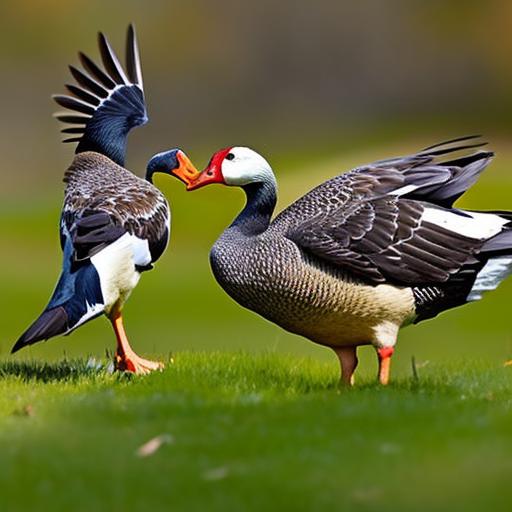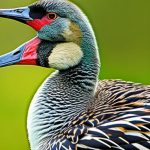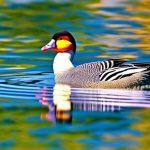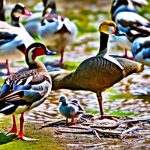Geese invading yards can be a frustrating problem for homeowners. These large birds can cause significant damage to lawns and gardens, leaving behind droppings and trampling plants. Fortunately, there are various ways to deter geese from your property, both natural and technological. By understanding the behavior of geese and implementing effective deterrents, you can keep your yard free from these unwanted visitors.
Key Takeaways
- Geese invade yards because they are attracted to the grass and water sources.
- Geese can cause damage to lawns and pose health risks to humans and pets.
- Natural deterrents like tall grass and certain plants can discourage geese from entering your yard.
- Fencing, netting, and other physical barriers can effectively keep geese away.
- Sound and light repellents, motion-activated devices, and scents and taste repellents can also be effective in deterring geese.
Understanding the Behavior of Geese: Why They Invade Your Yard
Geese are attracted to certain areas for several reasons. They prefer open spaces with water and grass, making residential yards an ideal location for them to settle. Geese are also social animals and tend to gather in large groups, known as flocks. When one goose finds a suitable area, others will often follow.
While geese may seem harmless, they can become a nuisance for homeowners. Their droppings are not only unsightly but can also pose health risks. Goose droppings can contain bacteria such as E. coli and salmonella, which can contaminate water sources and cause illness in humans and pets. Additionally, geese can be aggressive, especially during nesting season, and may attack humans or other animals that come too close to their nests.
The Negative Impact of Geese on Your Lawn: Reasons to Keep Them Away
Geese can cause significant damage to lawns and gardens. Their constant grazing can lead to overgrazing, resulting in bare patches on your lawn. They also have a tendency to trample plants, causing them to die or become stunted in growth. This can be particularly frustrating for homeowners who take pride in their landscaping.
In addition to the physical damage they cause, geese droppings can also have a negative impact on your lawn and garden. The high nitrogen content in goose droppings can burn grass and plants, leading to discoloration and poor growth. The droppings can also create an unpleasant odor and attract other pests, such as flies.
Natural Deterrents: Using Plants and Landscaping to Keep Geese at Bay
One effective way to deter geese from your yard is by using natural deterrents. Certain plants and landscaping features can make your yard less attractive to geese. Tall grasses and shrubs can create barriers that make it difficult for geese to access your lawn. They prefer open spaces where they can easily spot predators, so creating obstacles can discourage them from settling in your yard.
Another natural deterrent is the use of plants that geese find unappealing. For example, geese dislike the taste of certain grasses, such as Bermuda grass or Kentucky bluegrass. By incorporating these types of grasses into your lawn, you can make it less desirable for geese to graze on.
Physical Barriers: Fencing and Netting to Keep Geese Off Your Property
Physical barriers can be an effective way to keep geese away from your property. Fences and netting can create a physical barrier that prevents geese from accessing your yard. However, it’s important to choose the right type of barrier and install it properly.
Fences should be at least three feet high to prevent geese from easily hopping over them. They should also be buried at least six inches into the ground to prevent geese from digging underneath. Netting can be used to cover ponds or other water features to prevent geese from landing in them.
While physical barriers can be effective, they may not be suitable for all situations. They can be expensive to install and may not be aesthetically pleasing. Additionally, they may not be practical for larger properties or areas with a lot of open space.
Sound and Light Repellents: How to Use Noise and Light to Scare Geese Away

Sound and light can be used to scare geese away from your yard. Loud noises, such as clapping or using a whistle, can startle geese and make them uncomfortable. Flashing lights can also be effective in deterring geese, as they disrupt their vision and make them feel threatened.
There are various sound and light repellents available on the market, ranging from motion-activated devices to handheld tools. These devices emit loud noises or flashing lights when geese approach, scaring them away. It’s important to use these repellents strategically and rotate their placement to prevent geese from becoming accustomed to them.
Motion-Activated Devices: Using Technology to Deter Geese
Motion-activated devices can be an effective way to deter geese from your yard. Sprinklers that are triggered by motion can startle geese and make them uncomfortable. Decoys that move or make noise can also be effective in scaring geese away.
When using motion-activated devices, it’s important to place them strategically and change their location periodically. Geese can become accustomed to the presence of these devices if they are not moved regularly. Additionally, it’s important to ensure that the devices are functioning properly and are set up in areas where they will be triggered by geese.
Humane Solutions: How to Keep Geese Away Without Harming Them
It’s important to deter geese from your yard in a humane way that does not harm them. While it may be tempting to resort to more aggressive methods, such as trapping or shooting, these methods are not only cruel but may also be illegal in some areas.
Instead, focus on using natural deterrents, physical barriers, and sound and light repellents to keep geese away. These methods are effective in deterring geese without causing harm. If you do encounter a persistent problem with geese on your property, consider contacting a wildlife control company that specializes in humane goose removal.
Scents and Taste Repellents: Using Odors and Flavors to Keep Geese Away
Scents and taste repellents can be used to deter geese from your yard. Certain odors, such as grape extract or predator urine, can make geese uncomfortable and discourage them from settling in your yard. These repellents can be sprayed on grass or plants to create an unpleasant environment for geese.
It’s important to note that scents and taste repellents may need to be reapplied regularly, especially after rain or watering. Additionally, it’s important to choose repellents that are safe for use around children and pets.
Professional Services: Hiring Experts to Keep Geese Off Your Property
If you’re struggling to keep geese away from your property, consider hiring professional services to help. Wildlife control companies specialize in humane goose removal and can provide effective solutions for deterring geese from your yard.
When choosing a professional service, it’s important to do your research and find a reputable company. Look for companies that have experience dealing with geese and have positive reviews from previous customers. Additionally, consider getting multiple quotes and comparing services before making a decision.
Prevention Strategies: How to Keep Geese from Returning to Your Yard
Preventing geese from returning to your yard requires a proactive approach. Remove any food sources that may attract geese, such as bird feeders or open garbage cans. Keep your yard clean and free of debris, as geese are attracted to areas with easy access to food.
Regularly maintain your lawn and garden by mowing the grass and trimming shrubs. This will make your yard less attractive to geese, as they prefer areas with tall grasses and overgrown vegetation.
Keeping geese away from your yard can be a challenging task, but with the right strategies, it is possible. By understanding the behavior of geese and implementing effective deterrents, you can maintain a goose-free yard. Experiment with different methods and find what works best for your situation. Remember to prioritize humane solutions and avoid harming geese in the process. With persistence and patience, you can enjoy a beautiful and goose-free yard.
If you’re looking for effective ways to keep geese off your yard, you might also be interested in learning about the benefits of having a chicken coop with a trampoline. Yes, you read that right! According to an article on PoultryWizard.com, a chicken coop with a trampoline can provide numerous advantages for both chickens and their owners. Not only does it offer a fun and stimulating environment for the chickens, but it also helps to keep them safe from predators. To find out more about this unique concept, check out the article on PoultryWizard.com.
FAQs
What are geese?
Geese are waterfowl birds that belong to the family Anatidae. They are known for their long necks, webbed feet, and distinctive honking sound.
Why do geese come to my yard?
Geese are attracted to yards because they offer a source of food, water, and shelter. They also prefer open spaces where they can graze and keep an eye out for predators.
What problems can geese cause in my yard?
Geese can cause a number of problems in yards, including damage to landscaping, fouling of lawns and walkways with their droppings, and aggressive behavior towards people and pets.
How can I keep geese off my yard?
There are several methods for keeping geese off your yard, including using decoys, installing fencing or netting, using repellents, and modifying the landscape to make it less attractive to geese.
What are some natural repellents for geese?
Some natural repellents for geese include planting certain types of vegetation, such as tall grasses and shrubs, using predator decoys, and playing recordings of goose distress calls.
Is it legal to harm or kill geese?
In most cases, it is illegal to harm or kill geese without a permit. However, there are some exceptions for situations where geese are causing significant damage or posing a threat to public health and safety. It is important to check with local authorities before taking any action against geese.
Meet Walter, the feathered-friend fanatic of Florida! Nestled in the sunshine state, Walter struts through life with his feathered companions, clucking his way to happiness. With a coop that’s fancier than a five-star hotel, he’s the Don Juan of the chicken world. When he’s not teaching his hens to do the cha-cha, you’ll find him in a heated debate with his prized rooster, Sir Clucks-a-Lot. Walter’s poultry passion is no yolk; he’s the sunny-side-up guy you never knew you needed in your flock of friends!







